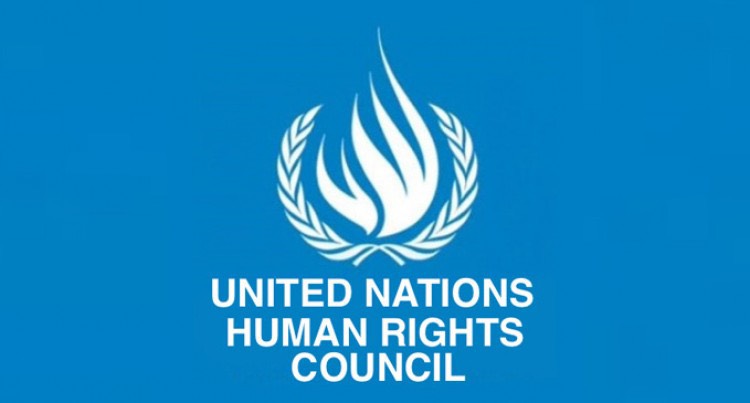On August 23, 2019, 23 NGOs wrote to the United Nations Assistant Secretary-General for Human Rights (ASG), the President of the Human Rights Council (HRC), and the Special Rapporteur on the situation of human rights defenders, to raise concerns over an alarming pattern of intimidation and reprisals faced by members of civil society during sessions of the Human Rights Council and Treaty Bodies.
The letter calls on the ASG to raise this issue during his speech before the HRC on September 19, 2019, and urges the OHCHR to take measures to ensure that such acts of reprisals are not repeated in the future.
To: Mr Andrew Gilmour, Assistant Secretary-General for Human Rights; H.E. Mr Coly Seck, Permanent Representative of Senegal and President of the Human Rights Council; Mr Michel Forst, Special Rapporteur on the situation of human rights defenders
Mr Gilmour,
We, the undersigned organisations, write to raise deep concerns about a consistent pattern of intimidation and reprisals faced by members of civil society from around the world during sessions of the Human Rights Council (HRC)and the Treaty Bodies. We are particularly concerned by acts of intimidation perpetrated by representatives of and individuals affiliated with government parties.
During the 41st session of the HRC, staff of Permanent Missions and individuals wearing non-diplomatic badges, who were later verified as working with UN Member and Observer States, attended our side-events, and blatantlyeavesdropped on our conversations, recorded our comments, took photos and videos of the audience, and made threatening gestures and remarks.
We are all the more concerned as this is not the first time that human rights defenders and other individuals engaging with the HRC have faced acts of harassment and intimidation. Rather, these tactics are part of a consistent and systematicpattern of behaviour that we have unfortunately come to anticipate and expect at every session of the HRC.
Furthermore, HRDs engaging with the Treaty Bodies also face intimidation and reprisals perpetrated by representatives of and individuals affiliated with government parties. There have been multiple instances of so-called “GONGOs” –governmental non-governmental organisations – registeringfor confidential and closed briefings with Treaty Bodies’members. This allows them to know exactly who among civil society is present during these briefings. There has also been cases of briefings that have been filmed without the permission of NGOs.
What is more, governments’ support given to GONGOsmeans that they are often granted consultative status with the UN. On the contrary, independent NGOs continue to be denied the ECOSOC status, demonstrating that reprisals against HRDs also occur within the UN system. In addition, the proliferation of GONGOs both at the HRC and Treaty Bodies, allows them to influence the discourse about human rights in a particular state or region, thus minimising the real issues at stake.
The aforementioned acts of harassment and intimidation are concerning not only because they create an atmosphere of fear and self-censorship, but also because numerous human rights defenders who have travelled to Geneva to participate in HRC or Treaty Body sessions have faced reprisals upon their return to their countries as a direct result of this. As such, we take these acts of intimidation very seriously and submit that they may result in further acts of retaliation.
We note with appreciation that the current president of the HRC, his Excellency Mr Coly Seck, Permanent Representative of Senegal, addressed some of the issues raised in this letter during the final meeting of the 41st session of the HRC. He expressed his concern that “civil society organisations continue to face intimidation and reprisals” and pointed out that a number of cases had been reported to him, including of verbal harassment and unauthorised photographs taken during side-events. He emphasised that “any acts of intimidation against any individual or group that attempts to cooperate with the Human Rights Council is unacceptable”, and reminded Member and Observer States of their responsibility to ensure that civil society operate in a safe space.
In addition, in July 2019, Unrepresented Nations and Peoples Organisation, working in conjunction with the University of Oxford, Tibet Justice Centre and the Economic and Social Research Council launched the report “Compromised Space for Unrepresented Peoples at the United Nations”. Based on interviews and testimonies from 77 HRDs working on behalf of minorities, indigenous communities and other unrepresented peoples, it identifies a systematic attack on the UN human rights system by certain governments. This is characterised by “blocking tactics […] including deferring ECOSOC status decisions, and intervening in plenary statements, to more overt instances of harassment, intimidation and outright violence, which constitute state reprisals”. Such challenges are compounded for HRDs from minority, indigenous and marginalised groups.
While we acknowledge that HRC presidents, the Office of theHigh Commissioner for Human Rights’ (OHCHR) reprisals team, the Treaty Bodies’ focal points for reprisals and yourself have all previously raised awareness on this issue, we strongly believe that there is a need to draw further attention to such acts of intimidation and harassment. We further note that to date, the OHCHR has not developed a systematic and practical response to the practices outlined in this letter.
It is our contention that failure to sanction reprisals on UN premises will only embolden such acts elsewhere. Therefore,we call on you to raise this grave pattern during the presentation of the UNSG annual report on reprisals during the 42nd session of the HRC. We also call on you to urge theOHCHR to take measures to ensure that such acts of intimidation do not happen in the future.
Yours sincerely,


 العربية
العربية Français
Français Deutsch
Deutsch